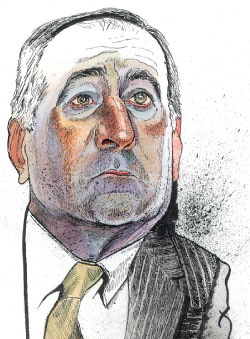
As he worked last week to slap together a shotgun marriage to save the firm he’d devoted more than three decades of his life to building, John J. Mack, the CEO of Morgan Stanley, had to savor the irony. Only three years ago, in 2005, he’d been Morgan Stanley’s savior, the dashing white knight who was going to pull Morgan out of the malaise of an ill-fitting merger with Dean Witter. What had made Mack’s arrival all the sweeter was how vindicating it was: Philip Purcell, Morgan’s tight-lipped, risk-averse outgoing CEO, had nudged Mack out of the company four years earlier; now, as they cheered in the hallways, the “wicked witch”—as Purcell’s enemies called him—was dead, and Mack was back. It was time to take some gambles, to really compete again. For a time, it worked. A year later, the stock was up 14 percent and the gap with rival Goldman Sachs was tightening.
Then came the subprime crisis, and Merrill, and Lehman, and AIG—and now a highly volatile stock price and the prospect of near dissolution. Of all the great Wall Street institutions, Morgan and Goldman were the ones least invested in the risky mortgages that ruined the others. An analyst report from last week suggested Morgan Stanley was healthier than most any company on the Street, but the firm was on the defensive nonetheless. “It’s very clear to me,” Mack wrote his employees in an e-mail last week, “we’re in the midst of a market controlled by fear and rumors, and short sellers are driving our stock down.”
Mack’s detractors look at it another way. In their view, Purcell’s reluctance as Morgan’s CEO to play with sophisticated market instruments was a principled strategy that might have led the firm down a safer path. It was Mack’s insistence that Morgan compete with the others—leverage the firm more, dive headlong into securitized debt, and grab those “alpha” returns that surpass market indexes—that put the bank in peril. Purcell was a consulting and retail financial-services guy. “Purcell never really understood how a securities firm made money, other than the simple fees from M&A,” says one former Morgan executive. “He was a throwback to the sock-and-stocks era.” The big question now, this source says, is “Would his ignorance have been bliss?”
John Mack has never been accused of holding anything back. A son of Lebanese immigrants in Mooresville, North Carolina, Mack joined Morgan Stanley as a bond salesman in 1972. He was a phone slammer, hard-charging and volatile. He also aspired to be larger than life, eating up press attention as he became president in 1993, left the company in 2001, led Credit Suisse First Boston for four years (where Mack the Knife, as he was called, cut 10,000 jobs), and then returned, triumphant, in 2005. In his sixties now, he still gives big pep talks and glad-hands employees in the elevators. But while Mack was being hailed for bringing back Morgan’s high-polished in-house corporate culture, he actually was changing that culture, too—speeding it up. “John Mack came in and—taking just one piece out of Goldman’s recipe—publicly committed to more risk, in a firm that had no history of it,” says another former Morgan executive.
Mack can rightly point to the fact that Morgan didn’t put too much money into subprime mortgages to begin with. And when the mortgage crisis hit, Mack’s people worked the problem to Morgan’s advantage. In the first quarter of 2007, the firm earned $1 billion by shorting subprime mortgages and topped Goldman Sachs. Still, the leverage needed to produce these returns was dangerous. “The biggest change in strategy was increasing the size of the balance sheet very, very rapidly while not increasing the book value of the firm,” says one source sympathetic to Purcell’s approach. “This is the truly fatal mistake: overleveraging the firm.”
Scrambling for funds from China, Morgan needs saving again now—a partner to provide the security of cash in exchange, perhaps, for the prestige of the Morgan Stanley name. The likeliest suitor now is troubled Wachovia, hardly a prize, with its own beaten-down share price. “This is a tough one to make complete sense of,” Steven Rattner said on CNBC. “It feels like two people who have fallen overboard clutching each other.”
Sure, it’s not all his fault. But it’s only natural to ask now if Mack’s gung-ho crusade to save the “soul” of Morgan Stanley may be what crushes it in the end.

• James J. Cramer on Post-Crisis Wall Street
• The Greed & Fear Guru Surveys the Future
• How a Lehman Trader Copes With Income Shrinkage
• Why Merrill Was Blessed and Lehman Was Damned
• How a Smaller Wall Street Will Change Us
• How Financial Firms Are Like Naughty Kids